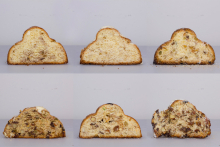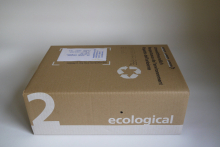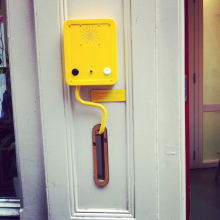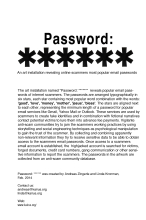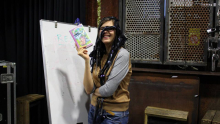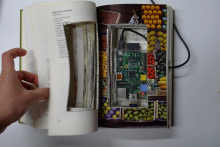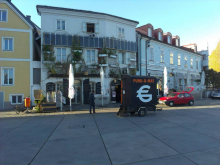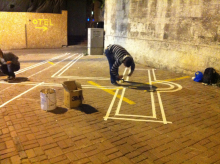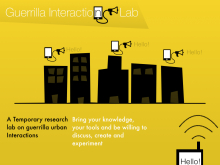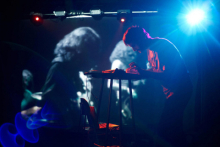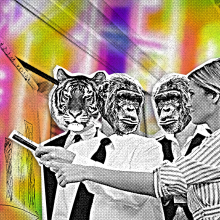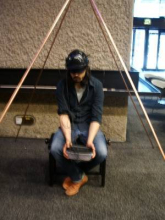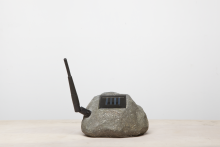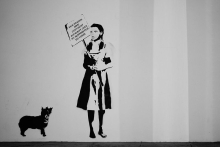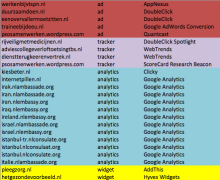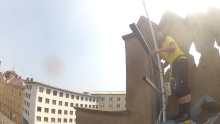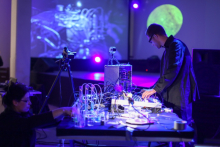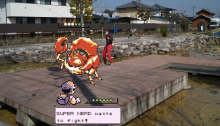Within the exhibtion at afo Unpleasant design opens a temporary research lab for Linz. Be part of it an join the worklab for two days research!
Program 2014
Thursday 29.05.
00:00 - 24:00
Taste of data is an ongoing project where statistics and cuisine are combined together. It is in fact data visualization practice yet brought on a new level by cooking. For the purposes of this project a recipe is being combined with related data sets of statistics, thus the ingredients and the proportions composing the recipe are calculated according to these sets. After the dish is being prepared the audience is invited to taste and eat the produced results, judge the savor and discuss.
The outcomes of Taste of AMRO 2014 will be presented on Saturday evening.
A live Mail Art Piece Two-Channel Video, 10 min, Full HD «Delivery for Mr. Assange» is a 36-hour live mail art piece. In January 2013, !Mediengruppe Bitnik sent Wikileaks-founder Julian Assange a parcel containing a camera. Through a hole in the parcel, the camera documented and live-tweeted its journey through the postal system, letting anyone online follow the parcel's status in real-time. The parcel was intended as a SYSTEM_TEST, inserted into a highly tense diplomatic crisis. Would the parcel reach its intended destination?
In the AMRO SHOWCASE you find a Video Documentary about the project.
At the same time this is an opportunity to install
LEAVEAMESSAGE Boxes in Linz! Interested to get a LEAVEAMESSAGE Box in front of your art organisation? Join the Workshop!
LEAVEAMESSAGE box is participative project that attempts to initiate a network of voice mailboxes that allow members of the public to record and distribute audio messages in public space.
Software &/or Hardware:
hardware:
*a modified cashbox
inside the box:
*raspberry pi + pi cobbler
*usb sound adapter
The art installation 'Password: ******' reveals popular email passwords of internet scammers. The passwords are arranged typographically in six stars, each star containing the most popular word combination with the words: 'good', 'love', 'money', 'mother', 'jesus', 'bless'. Email services like Gmail, Yahoo Mail or Outlook are used by scammers to create fake identities and in combination with fictional narratives contact potential victims to lure them into advance fee payments.
The days of VHS cassettes seem to be over! It's still fun, though, to get your hands dirty and dip into the history of copyright, which makes being creative in the digital age even more complicated today.
In the exhibition you will find a trash mountain of tapes and a flavour of times past. Join the research lab and create analog glitches while talking about copyright issues and Digital Rights Management!
Bibliotecha is a framework to facilitate the local distribution of digital publications within a small community. It relies on a microcomputer running open-source software to serve books over a local wifi hotspot. Using the browser to connect to the library one can retrieve or donate texts. Bibliotecha proposes an alternative model of distribution of digital texts that allows specific communities to form and share their own collections.
The GIBLING is a community currency founded by Stadtwerkstatt in 2012.
Its aim is to establish an alternative value system based on the principle of cashflow safe money; money which can't be accumulated and has to be spent in time.
Drones - unmanned aerial vehicles - are becoming ubiquitous, yet remain almost invisible. At the exhibtion you find the new released Drone Shadow Handbook and open instructions how to draw a drone.
Being in contact with James Bridle and with his consent we are looking for a facilitator for drawing a drone for Linz!
Please get in touch with us and lets draw a drone! mail to amro@servus.at
Exposing the Invisible is Tactical Tech's 3-part series of short films examining some of the most inspiring and provocative investigative cases, those that go further than traditional journalistic investigations.
We spoke to hackers, activists and investigators from the UK, to Lebanon, Israel and Pakistan to find how they work with evidence, data and visualisation.
!!! CANCELED !!!
Software &/or Hardware:
usb Midi controller X-session, backlight computer keyboard, linux laptop with ssd, puredata, pdp, jackd
Operating System:
arch linux
09:30 – 10:45
10:30 – 13:30
Revisiting The Spam Folder: Using 419-fiction For Interactive Storytelling. A Practical Introduction.
11:00 – 13:00
At AMRO 2014 Donna Metzlar will be available for privacy advice - explaining the jargon and make your digital life more secure. In doing so topics like a "live CD", certificates, key management and cryptography will be discussed. There will be USB sticks with TAILS with The Amnesic Incognito Live System (TAILS) installed for people to try, and to take home.
Bibliotecha is a framework to facilitate the local distribution of digital publications within a small community. It relies on a microcomputer running open-source software to serve books over a local wifi hotspot. Using the browser to connect to the library one can retrieve or donate texts. Bibliotecha proposes an alternative model of distribution of digital texts that allows specific communities to form and share their own collections.
11:00 – 16:00
A short introduction (20 min) to participants will briefly cover the theory of the effects on psyche by weak geo-electromagnetic fields from which the project has developed, including demonstrating an entirely synthetic electronic variant of the amplifier/helmet
This will ground participants in both the practical and playful nature of the project.
12:00 – 15:30
Hivenetworks, started by Alexei Blinov and collaborators nearly 10 years ago, is an Open Source project that explores the new concepts of DIY network building, mesh architectures and ubiquitous computing. The aim is to take the DIY networking and publishing to the point where it becomes accessible to anyone with creative mind and basic knowledge of computing.
13:00 – 15:00
Valie Djordjevic, editor for the German copyright website, iRights.info, explains the general concepts, ideas and problems with current copyright regimes in the face of digital challenges. IANAL and TINLA – I am not a lawyer and this is not legal advice: the Copyright Clinic does not give legal advice on specific cases but enters into a dialogue with the questioners.
Image Source and Licence:
https://commons.wikimedia.org/wiki/File:Bono-Act-consequence.jpg
This file is licensed under the Creative Commons Attribution-Share Alike 3.0 Unported license.
14:00 – 18:00
14:00 – 16:00
Unitary Networking is a speculative approach to communications infrastructure, trying to establish a link between urban technology and communication technology and reflecting on the way they form networks of power.
15:00 – 17:00
Valie Djordjevic will be present during consultation hours 15:00 - 17:00. Take the opportunity speaking with her within the exhibtion.
Valie Djordjevic, editor for the German copyright website, iRights.info, explains the general concepts, ideas and problems with current copyright regimes in the face of digital challenges. IANAL and TINLA – I am not a lawyer and this is not legal advice: the Copyright Clinic does not give legal advice on specific cases but enters into a dialogue with the questioners.
Image Source and Licence:
During these consultation we can discuss the issue of web tracking. Lonneke van der Velden keeps a diary about the third parties encountered on Dutch governmental websites (http://thirdpartydiary.net/?page_id=2). If you want you can bring your favourite data set for inspection as well. We use the Tracker Tracker software developed by the Digital Methods Initiative (https://wiki.digitalmethods.net/Dmi/ToolTrackerTracker). It take 5-10 minutes per 100 urls.
16:00 – 16:45
A presentation by Salma Adel chaired by Reni Hofmüller
P E R S O N A L B I O G R A P H Y
Salma is a product designer and a passionate photographer. She graduated in 2013 from the faculty of Applied Arts and Sciences, at the German University in Cairo, with BAAS degree (bachelor of Applied arts and Sciences) in Product Design.
17:00 – 19:00
19:00 – 21:00
The time of ridiculing those who were not taken seriously as “paranoid geeks” seems to have passed at the moment, as the surveillance scandals have reached the mainstream. There is a newly awakened discussion of decentralizing infrastructure and alternative possibilities outside the realm of the large monopolists that determine access to information and tools and cooperate with secret services. Do these new insights actually result in a chance for alternatives, and who really needs them? Why is digital self-defense left up to the users?
A discussion with:
Klau
Vesna Manojlovic
22:00 – 23:00
23:00 – 23:20
Software &/or Hardware:
arduino, arduino shields, dust sensors, other sensors, analog synths and sequencers ...
23:30 – 23:50
Audiovisual performance with nanobots, nanofluids and analog synths
The sound-video performance echo 10-9 takes place on the nano and microlevel. With a clear analog esthetic it demonstrates the formal characteristics of materials, which are transformed on the spot, creating ambient a/v landscapes.
24:00 – 24:20
Software &/or Hardware:
puredata + thinkpad X61 + mikrophon
Operating System:
#! linux



